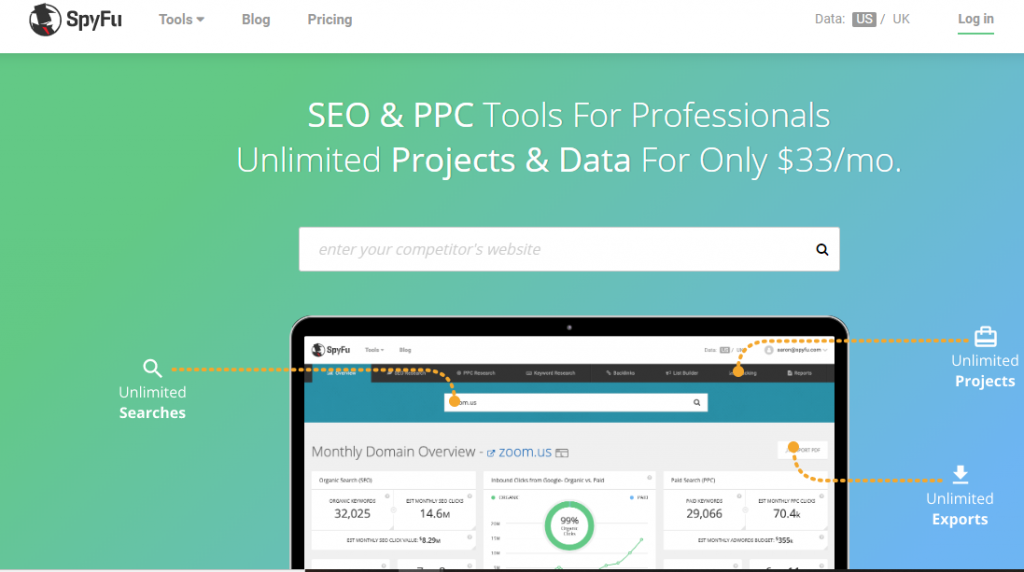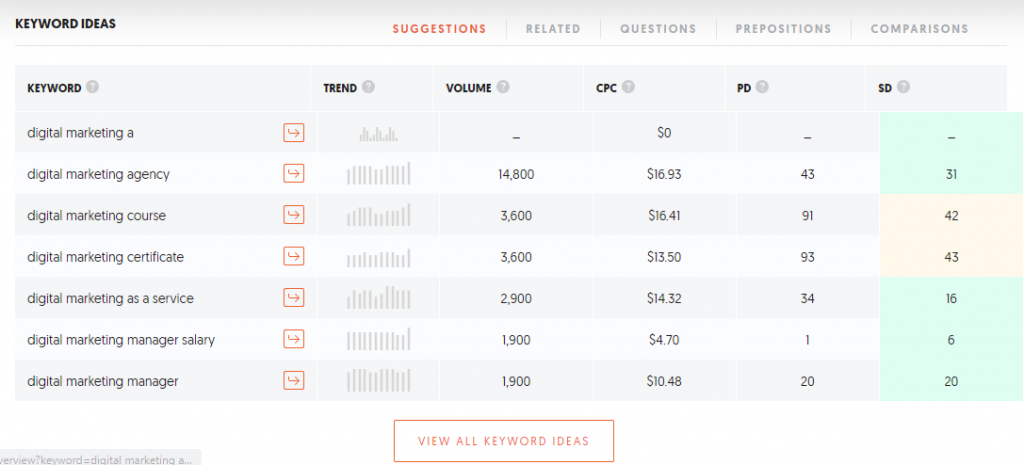Keyword Research For Content Writers – Tips And Tools
June 28, 2020
Article Overview
10min read
Keywords are an essential part of content creation. Once included in your website content, these help users find your articles on search engines. They also help SEO-based agencies look for various trending topics to write about. There is nothing scary or technical about these keywords, but why do writers feel reluctant towards doing keyword research?
A common reason for this has been attributed to the fact that SEO writers feel that keyword research takes the creativity out of the process of writing. However, optimizing your content for search engines need not impact its quality. It can, in fact, be compared to a round of editing—just as editing could improve your article’s overall readability, keyword research will help enhance your article’s relevance and exposure. This could assist in writing content that could reach out to your target audience efficiently.
As part of a content agency, keyword research should be done in tandem with content creation. In the following, we aim to provide a brief insight into the entire process of keyword research—from the steps to be followed before writing any type of content to optimizing and publishing keyword-based content. Read on to know more.
Keyword research for copywriting: Essential tips

When creating any type of content, you, as a writer, would have a clear routine. From keyword research, understanding any possible sources, and starting the process. However, many content writers tend to write what they want to write and then include a keyword or phrase in the article. This could result in two main issues:
- The keyword may not really fit in the article and may sound forced
- The keyword chosen may fit but not be relevant to your target audience or be too competitive to rank for
Having a list of keywords to create content will help you with certain benefits such as the following:
Reduced occurrences of writer’s block: A keyword list can be a helpful way to generate content ideas. For example, when you are stuck with what to write about, you can look for a high-quality keyword and craft your ideas around it.
Understanding your priorities: Having an organized keyword list will help you set your priorities straight. For example, if you have a keyword that will help drive up the traffic and visibility of your website, you will know to dedicate resources to create content for that keyword on priority. You can then move down the list accordingly.
No forced keywords: When you have a specific keyword phrase in mind, your writing will naturally include the keyword in the article. Therefore, you will be able to avoid any awkward phrases or forced keywords.
The following points will help you know where to begin your keyword research and begin writing your content.

Understanding your visitor’s search intent: Understanding the intent of your user’s search will help you fill in any gaps that may arise. Based on their needs and searches, you will be able to acquire specific keywords and provide them with the content they actually need. Conventional keyword research has been found to have certain limitations and do not always offer results based on the query search. There are multiple variations for a simple keyword; a common example has been listed as follows:
If a user searches for the keyword Barcelona, the first results that would primarily pop up are about the football team, FC Barcelona. The result would not serve the intent of those looking for the city of Barcelona. However, there is a link available for those looking for the city of Barcelona.

The above example proves that Google has created patents that help users to access topic-related results. Therefore, by taking advantage of this and providing the content that your audience needs, you will be able to enhance the traffic to your website.
Filtering the keywords will give you a variety of topics to write on. Besides increasing your content on your website, you will be able to provide relevant articles for your users to keep returning to your website.

Finding content topics that remain relevant through time: Looking for keywords is not the only process to be followed when creating content. When researching keywords, you should look for topics that will let people return to your website. Information that doesn’t alter in time should often be used and updated with any changes. This will let you rank for keywords even after you post it.
There are some tips you can follow to ensure that your content stands the test of time. Some of these have been listed as follows:
- Writing about the historical evolution of a certain product, service, or a topic
- Creating how-to guides
- Making a list of frequently asked questions and answering them
- Sharing best practices (as a separate article or as part of it)
- Elaborating case studies
- Explaining the history of your business or your success stories

Checking for any duplicate or plagiarized content: Even though there is no penalty levied on duplicate content, it could cause damage to your website’s ranking. If Google finds any duplicate content, it will not feature your website’s article in the search engines results page (SERP). It showcases your content in the section known as Google Omitted Results.
Moreover, if you continue to keep spamming and getting flagged often, Google might not even consider indexing your site on its SERPs. Since this could take a toll on your website, it is important to write unique topics, or at least in a unique way, on keywords that you research for your company’s website.
An effective way to detect duplicate content is to use a reliable website audit tool. If any articles, titles, or descriptions show up, you will be able to change it immediately.

Using keyword research tools: Depending on your business size, keyword research may be done by a separate team altogether or by the content writers itself. Doing this process all by yourself without any assistance will take an enormous amount of time. Here’s where a reliable keyword research tool steps in. These tools help to greatly reduce the efforts you would have put into finding relevant topics that your website can rank for. Once you have these keywords, the next step is writing and keeping important SEO requirements in mind—the number of times a keyword would appear in an article, not to let your keyword seem forced, writing a unique piece that matches the SERP criteria, writing a title that fits the word limit, and writing a meta-description that fits the page design.
In the following section, we have listed some of the popular keyword research tools that could help you, as a content writer, perform your tasks efficiently and enable you to churn out quality content each time around.
Popular keyword research tools

Keyword research is an essential part of content creation; therefore, every bit could be of great help. This is where a keyword research tool could come in although there is no single choice that could assist all writers in all circumstances. Using such tools can improve the whole process and enhance the way you create content on your website.
In the following, we have listed some of the popular keyword research tools, although in no particular order. These can help you choose the one that would suit your needs best.

SEMrush: This is one of the popular tools available for keyword research and analysis. It offers a comprehensive array of features, delivers in-depth data, and also provides an insight into your competitors’ tactics.
This keyword research tool helps you know which keywords you are currently ranking for; moreover, you can also check your positions for different keywords and also discover new keywords that you might be ranking for without targeting for it. On SEMrush’s organic research tab, you can simply add your URL and access data including the traffic that you are earning and its estimated value. These factors will enable you to see how effective your content and other activities (advertisements, announcements, etc.).
The same features are available when examining your competitors’ websites. By doing so, you will be able to find newer keywords that you may have not previously considered.
This keyword research tool also provides a keyword gap report—this comprises the keywords that many of your competitors are ranking for but are not currently being targeted by you. SEMrush offers multiple features that can help carry out keyword research efficiently. There is a free trial available to check out the features being offered. Among the plans offer, the Pro plan is the most budget-friendly one and starts at around $83 per month if billed annually.

Google Keyword Planner: This keyword research tool is very simple. However, if you have an AdWords account, you can use the Keyword Planner for free. It is one of the most accurate sources of information about keywords and SEO available out there.
The Google Keyword Planner allows you to access additional keyword suggestions based on the ones that you already may be using. Moreover, besides in-depth data, it offers insights into the keyword search volume and the traffic that you may acquire on your website. If you aim to use your SEO keywords for paid ad campaigns, Google Keyword Planner also lets you get an estimate of the required bid to get your advertisement seen.
This keyword research tool has proven to be highly accurate with the features that it offers. It provides relevant keywords (including key phrases) related to the products and services offered by your business.

SpyFu: This keyword research tool, as the name suggests, that helps analyze your competitors’ marketing techniques and their SEO strategies. This is one of the most popular tools available that will help you stay updated about how your competitors are performing in the market; moreover, if your business belongs to a specific niche category, SpyFu will help you look for valuable keywords to target that is comparatively untapped in the market. This is beneficial in many ways. By knowing which keywords you will need to target will help you improve the traffic to and the visibility of your website.
SpyFu offers detailed data that is accessible enough for even average users. It also offers ongoing site monitoring features that can let you keep track of the trends and which of your content or advertisements are performing well and which aren’t. Yes, that’s right, SpyFu is not only limited to SEO but also provides valuable information related to PPC (pay-per-click) ads and the variations on ad campaigns. It lets you optimize your marketing and content campaigns by analyzing your competitors’ work and letting you access the sections that your competitors are missing out on. This can be basically compared to letting other businesses do your work for you.
SpyFu offers an in-depth feature set and reports that are easily accessible. Its plans start at around $33/per month (Basic Plan) if billed annually; but, it does not offer a free trial. SpyFu’s pricing factor makes it a great choice for businesses in competitive avenues. However, like many other keyword research tools, this tool is less optimized for independent keyword research.

Ahrefs Keyword Explorer: Ahrefs is also one of the top keyword research tools for search engine optimization. This is a great tool with lots of technical features. Nonetheless, once you get the hang of using this tool for keyword research, you will see that Ahrefs has a lot to offer.
This tool provides accurate data and provides insights into how you can score well for keywords that are specific for your business. Moreover, there are helpful metrics that can help you improve your website’s click-through rates. You can also find detailed SERP (search engine results page) that can let you acquire keywords that are quite easy to rank for in your niche group.
Like many offer SEO applications, Ahrefs allows users to access its entire set of tools; it does not offer its Keyword Explorer separately. These tools offer website audits, rank trackers, site explorers, and much more. Ahrefs also a Content Explorer to help you optimize your website’s content. This keyword research tool provides immense data to be mined and analyzed. They offer a 7-day trial for $7. Moreover, their plans start at around $82/per month if billed annually.

KWFinder: This keyword research tool almost exclusively focuses on keyword research and discovery. It helps writers discover useful keywords with detailed suggestions and even ad hoc searches. This keyword research tool also provides SERPs-specific (search engine results pages) tools that will enable websites to find ways to improve your rankings.
It also helps companies conduct keyword analysis for keywords that their competitors are using. This will help you filter keywords that are not going to profitable for your business. This keyword research tool provides useful information that will help SEO writers know which ones are strong enough for their business. It also provides keyword variants and long tail and domain keywords. However, this tool is limited to only keyword-specific queries.
When choosing keywords for your content writing strategy, the KWFinder can be a great choice. They offer a 10-day free trial whereas their basic plan starts at around $29.90/per month if billed annually.

Moz Keyword Explorer: Moz is one of the most reliable resources for learning about search engine optimization. This is why the Moz Keyword Explorer is one of the popular keyword research tools for SEO content writers.
This tool offers unique features such as finding out organic CTR scores (this refers to the relative score of the number of clicks you can expect to receive for your website) for your website and the second is the priority score. Moz provides a score to help you find the best keywords by combining and analyzing factors such as CTR, volume of traffic, and the difficulty of keywords.
Moz Keyword Explorer allows users to access their features with a 30-day free trial of Moz Pro. However, post this trial period, the plans start from around $79/per month if billed annually. You will be able to perform around 30,000 (with the Premium plan) keyword queries per month. This keyword research tool offers useful metrics that are not provided by other common SEO tools. This tool will, overall, help enhance your SEO article writing strategy.

Serpstat: This keyword research tool offers multiple SEO-based features such as website analytics, keyword research, rank tracking, SERP analysis, and much more. Besides allowing users to conduct individual page analysis, Serpstat lets you check how your competitors’ websites and pages are ranking. The Tree View feature helps you look for search terms for which you may have almost reached the top 10 search engine results page (SERP); this feature lets you check for any gaps in and enhance your content writing.
Serpstat also offers a filter that enables you to set certain criteria to refine your research. Since SEO comprises a large amount of data, having it filtered based on your needs could be very helpful. This tool has a great user interface and the plans are quite affordable. The plans start at around $55/per month if billed annually.

Majestic: Majestic Keyword Checker is another great keyword research tool for SEO content writers. It helps you track your website’s search engine rankings over time. Its plans offer features such as keyword functionalities, bulk research options, and even API integration. Companies and SEO writers can easily research their competitors’ strategies based on individual keywords and phrases; this will help you know which keywords should be targeted.
The Majestic tool is a great choice if you want to conduct more than keyword research, from planning your content writing to optimizing your backlinks. This keyword research tool also offers a strong online analysis. The plans start at around $39.99 per month.

LongTailPro: Long-tail keywords have increasingly become a preference of the SEO world; this is because they tend to be less competitive and likely to convert as compared to shorter keywords. LongTailPro is a great choice if your company makes use of this trend. This keyword research tool is a great way to find high-value keywords that you would be able to incorporate in your content writing.
LongTailPro comprises valuable research tools for specific, niche keywords; these are based on seed keywords. The data provided are detailed and useful for content writers. This keyword research tool offers recommendations to help companies look for sources of high-end organic traffic. LongTailPro can perform around 2,500 SERP searches every day.
This keyword research tool has a great user experience for both novice and advanced users. With LongTailPro, you can acquire accurate data and keyword suggestions in bulk. However, there are certain limits to how many keywords you can research. The plans start at around $25/per month if billed annually.

Ubersuggest: This keyword research tool provides keywords that are normally not available through the Google Keyword Planner. However, it is recommended that you run a keyword search through Ubersuggest after checking your intended keywords through the Google Keyword Planner.
Once you type in your keyword in this tool and click on suggest, it generates a comprehensive list of keywords to help you delve do in-depth research for your content strategy. Ubersuggest also breaks down keyword results by the letter; for example, if you search for the keywords digital marketing and a, you would be shown results such as the following:

This keyword research tool gives you a great chance to review different keyword variations. The plans start at around $16 (or 56 AED) per month. In addition to a web search, you can also search images, YouTube videos and links, news websites, and shopping.
Keywords all the way…

Every content writer follows their own unique routine when creating or curating content for websites, be it for businesses or for themselves. The abovementioned tips aim to assist writers in following one of the basic steps when writing articles for effective SEO. Keyword research, although an expansive process, lets you stay ahead of your competitors and provide a high-quality output every single time.
If you are a novice at creating SEO-based content and are in the initial phases of doing keyword research, you can always avail of the services of a reliable SEO agency.


 +971 52 312 2506
+971 52 312 2506




